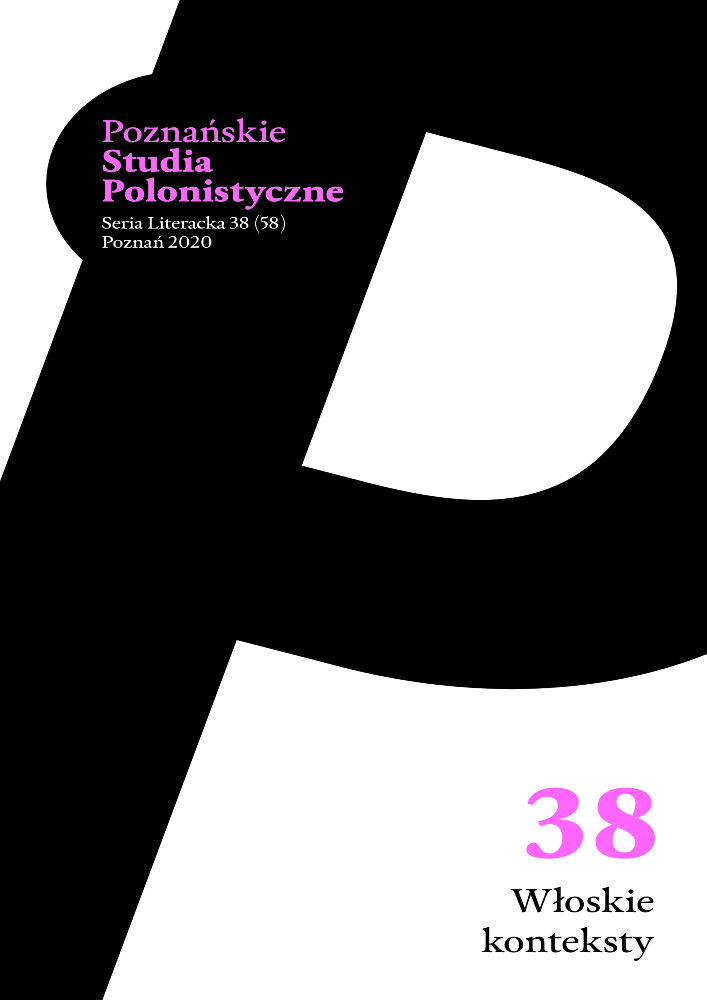Abstract
The article is an attempt at placing Operetka (Operetta) in the context of commedia dell’arte by comparing the basic structural and ideological characteristics of Witold Gombrowicz’s drama with the key traits of the commedia dell’arte genre. The author of Ferdydurke, who coined the phrase przyprawiać (komuś) gębę (put the screws to someone’s mug), brings to the grotesque distortion any manifestations of form domination both in life and in art. Ironically, it is the elements of Operetka, related to commedia dell’arte – a thoroughly conventionalised and schematised genre, that become the tool for a sort of removal of mask or mug. Given the mask, protagonists are given “a mug”, and cannot be themselves, they can only be what is allowed by the mask they were given and so they become its prisoner, in a way. The only antidote to “the mug” is nudity that frees one from any mask that forces them to play the designated roles. The article aims to present the relationship between Operetka and the commedia dell’arte genre, with particular emphasis on analysing the Gombrowicz’s concept of form against the convention of mask and costume in the commedia dell’arte, and on the “nudity” vs. “mask” opposition that focuses the drama’s main artistic and existential issues, while it is also precisely the point where the relationship between Gombrowicz’s work and Italian commedia dell’arte is seen most clearly.
References
Apollonio Mario (1982), Storia della commedia dell’arte, Sansoni, Firenze.
Błoński Jan (1994), Forma, śmiech i rzeczy ostateczne. Studia o Gombrowiczu, Znak, Kraków.
Chomicki Jerzy (2001), Operetka [hasło], w: Encyklopedia muzyki, red. Andrzej Chodakowski, PWN, Warszawa, s. 635-636.
Fava Antonio (1999), La maschera comica nella commedia dell’arte, Andromedia Editrice, Colledara.
Genette Gérard (1992), Palimpsesty. Literatura drugiego stopnia, przeł. Aleksander Milecki, w: Współczesna teoria badań literackich za granicą. Antologia, t. 4, cz. 2, red. Henryk Markiewicz, Wydawnictwo Literackie, Kraków, s. 317-366.
Głowiński Michał (2002), Gombrowicz i nadliteratura, Wydawnictwo Literackie, Kraków.
Gombrowicz Witold (1992), Ferdydurke, Wydawnictwo Literackie, Kraków.
Gombrowicz Witold (1997), Operetka, w: tegoż, Iwona, księżniczka Burgunda; Ślub; Operetka, Historia, Wydawnictwo Literackie, Kraków, s. 257-368.
Jarzębski Jerzy (1971), Pojęcie „formy” u Gombrowicza, „Pamiętnik Literacki”, t. 62, z. 4, s. 69-96.
Jarzębski Jerzy (1997), Dramat Ego w dramacie historii [słowo wstępne], w: Witold Gombrowicz, Iwona, księżniczka Burgunda; Ślub; Operetka, Wydawnictwo Literackie, Kraków, s. 5-11.
Jarzębski Jerzy (2004), Gombrowicz, Wydawnictwo Dolnośląskie, Wrocław.
Jarzębski Jerzy (2007), Gombrowicz teatralny, w: tegoż, Natura i teatr. 16 tekstów o Gombrowiczu, Wydawnictwo Literackie, Kraków, s. 88-100.
Mariti Luciano, red. (1980), Alle origini del teatro moderno. La commedia dell’arte, Bulzoni, Roma.
Mazurkiewicz Filip (2016), Niewidzialna „Operetka” Witolda Gombrowicza. Od męskości hegemonicznej ku męskości atopicznej, „Pamiętnik Literacki”, t. 107, z. 2, s. 113-136.
Miklaszewski Konstantin (1981), La commedia dell’arte o il teatro dei commedianti italiani nei secoli XVI, XVII e XVIII, z esejem autorstwa Carli Solivetti, Marsilio Editori, Venezia.
Miłosz Czesław (1988), To jedno, w: tegoż, Kroniki, Znak, Kraków, s. 8.
Nicoll Allardyce (1967), W świecie Arlekina. Studium o komedii dell’arte, przeł. Antoni Dębnicki, PIW, Warszawa.
Nyczek Tadeusz (1996), „Operetka”, czyli w stroju i na goło. „Operetka” i operetka, w: O Witoldzie Gombrowiczu: materiały z sesji w 95 rocznicę urodzin i 30 rocznicę śmierci pisarza, red. Elżbieta Brodowska-Skonieczna, Wojewódzka Biblioteka Publiczna, Kielce, s. 49-70.
Pandolfi Vito (1957-1961), La commedia dell’arte. Storia e testo, t. 1-6, Sansoni, Firenze.
Surma-Gawłowska Monika (2015), Komedia dell’arte, Universitas Kraków.
Taviani Ferdinando (1969), La commedia dell’arte. La fascinazione del teatro, Bulzoni, Roma.
Trojanowska Tamara (1989), Teatralne konsekwencje operetki w „Operetce”, „Dialog”, nr 5/6, s. 168-174.
License
Authors
Authors of texts accepted for publication in „Poznańskie Studia Polonistyczne. Seria Literacka” are required to complete, sign and return to the editor's office the Agreement for granting a royalty-free license to works with a commitment to grant a CC sub-license.
Under the agreement, the authors of texts published in „Poznańskie Studia Polonistyczne. Seria Literacka” grant the Adam Mickiewicz University in Poznań a non-exclusive, royalty-free license and authorize the use of Attribution-NoDerivatives 4.0 International (CC BY-ND 4.0)Creative Commons sub-license.
The authors retain the right to continue the free disposal of the work.
Users
Interested Internet users are entitled to use works published in „Poznańskie Studia Polonistyczne. Seria Literacka” since 2016, for non-commercial purposes only, under the following conditions:
- attribution - obligation to provide, together with the distributed work, information about the authorship, title, source (link to the original work, DOI) and the license itself.
- no derivatives - the work must be preserved in its original form, without the author's consent it is not possible to distribute the modified work, such as translations, publications, etc.
Copyrights are reserved for all texts published before 2016.
Miscellaneous
Adam Mickiewicz University in Poznań retains the right to magazines as a whole (layout, graphic form, title, cover design, logo etc.).
